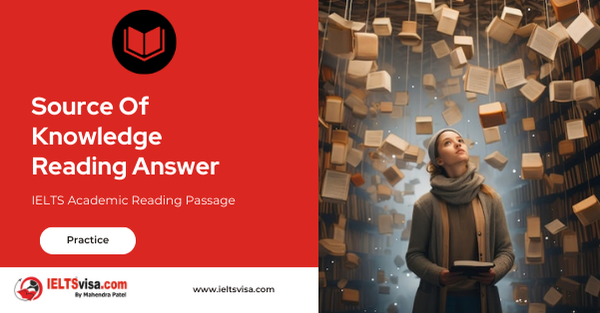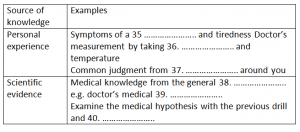Source Of Knowledge Reading Answer
IELTS Academic Reading Passage
A.
What counts as knowledge? What do we mean when we say that we know something? What is the status of different kinds of knowledge? In order to explore these questions we are going to focus on one particular area of knowledge-medicine.
B.
How do you know when you are ill? This may seem to be an absurd question. You know you are ill because you feel ill; your body tells you that you are ill. You may know that you feel pain or discomfort but knowing you are ill is a bit more complex. At times, people experience the symptoms of illness, but in fact they are simply tired or over-worked or they may just have a hangover. At other times, people may be suffering from a disease and fail to be aware of the illness until it has reached a late stage in its development. So how do we know we are ill, and what counts as knowledge?
C.
Think about this example. You feel unwell. You have a bad cough and always seem to be tired. Perhaps it could be stress at work, or maybe you should give up smoking. You feel worse. You visit the doctor who listens to your chest and heart, takes your temperature and blood pressure, and then finally prescribes antibiotics for your cough.
D.
Things do not improve but you struggle on thinking you should pull yourself together, perhaps things will ease off at work soon. A return visit to your doctor shocks you. This time the doctor, drawing on years of training and experience, diagnoses pneumonia. This means that you will need bed rest and a considerable time off work. The scenario is transformed. Although you still have the same symptoms, you no longer think that these are caused by pressure at work. You now have proof that you are ill. This is the result of the combination of your own subjective experience and the diagnosis of someone who has the status of a medical expert, You have a medically authenticated diagnosis and it appears that you are seriously ill; you know you are ill and have evidence upon which to base this knowledge.
E.
This scenario shows many different sources of knowledge. For example, you decide to consult the doctor in the first place because you feel unwell-this is personal knowledge about your own body. However, the doctor’s expert diagnosis is based on experience and training, with sources of knowledge as diverse as other experts, laboratory reports, medical textbooks and years of experience.
F.
One source of knowledge is the experience of our own bodies: the personal knowledge we have of changes that might be significant, as well as the subjective experience of pain and physical distress. These experiences are mediated by other forms of knowledge such as the words we have available to describe our experience and the common sense of our families and friends as well as that drawn from popular culture. Over the past decade, for example, Western culture has seen a significant emphasis on stress-related illness in the media. Reference to being ‘stressed out has become a common response in daily exchanges in the workplace and has become part of popular common-sense knowledge. Itis thus not surprising that we might seek such an explanation of physical symptoms of discomfort.
G.
We might also rely on the observations of others who know us. Comments from friends and family such as “you do look ill’ or ‘that’s a bad cough’ might be another source of knowledge. Complementary health practices, such as holistic medicine, produce their own sets of knowledge upon which we might also draw in deciding the nature and degree of our ill health and about possible treatments.
H.
Perhaps the most influential and authoritative source of knowledge is the medical knowledge provided by the general practitioner. We expect the doctor to have access to expert knowledge. This is socially sanctioned. It would not be acceptable to notify our employer that we simply felt too unwell to turn up for work or that our faith healer, astrologer, therapist or even our priest thought it was not a good idea. We need an expert medical diagnosis in order to obtain the necessary certificate if we need to be off work for more than the statutory self-certification period. The knowledge of the medical sciences is privileged in this respect in contemporary Western culture. Medical practitioners are also seen as having the required expert knowledge that permits them legally to pre-scribe drugs and treatment to which patients would not otherwise have access. However there is a range of different knowledge upon which we draw when making decisions about our own state of health.
I.
However, there is more than existing knowledge in this little story: new knowledge is constructed within it. Given the doctor’s medical training and background, she may hypothesise “is this now pneumonia?” and then proceed to look for evidence about it. She will use observations and instruments to assess the evidence and-critically-interpret it in the light of her training and experience. This results in new knowledge and new experience both for you and for the doctor. This will then be added to the doctor’s medical knowledge and may help in future diagnosis of pneumonia.
Questions 27-34
Reading Passage 3 has nine paragraphs, A-I Which paragraph contains the following information? Write the correct letter A-I, in boxes 27-34 on your answer sheet.
NB You may use any letter more than once.
27. the contrast between the nature of personal judgment and the nature of doctor’s diagnosis
28. a reference of culture about pressure
29. sick leave will not be permitted without professional diagnosis
30. how doctors’ opinions are regarded in the society
31. the illness of patients can become part of new knowledge
32. a description of knowledge drawn from non-specialised sources other than personal knowledge
33. an example of collective judgment from personal experience and professional doctor
34. a reference that some people do not realise they are ill
Questions 35-40
Complete the notes below. Choose
NO MORE THAN THREE WORDS from the passage for each answer. Write your answers in boxes 35-40 on your answer sheet.


Solutions For:- Source Of Knowledge Reading Answer
27. E
28. F
29. H
30. H
31. I
32. G
33. B
34. D
35. bad cough
36. blood pressure
37. friends and family
38. practitioner
39. diagnosis
40. backbackground
Review and Practice
- Regularly practice with IELTS reading samples and time yourself to get used to the pressure of the exam.
- Review your mistakes to understand where you went wrong and how to avoid similar errors in the future.
Our Books
Master IELTS Speaking Part 1
IELTS Writing Task 1 Book
IELTS Writing Task 2 Book
Source Of Knowledge Reading Answer Explanation
Comin Soon
Practice IELTS Other Modules
IELTS Listening
The IELTS Listening test assesses how well you can understand spoken English in various contexts. It lasts about 30 minutes and is divided into four sections with a total of 40 questions. The listening tasks become increasingly difficult as the test progresses.
IELTS Academic Reading
The IELTS Academic Reading section assesses your ability to understand and interpret a variety of texts in academic settings. It is designed to evaluate a range of reading skills, including skimming for gist, reading for main ideas, reading for detail, understanding inferences, and recognizing a writer's opinions and arguments.
IELTS Speaking
The IELTS Speaking test assesses your ability to communicate in English on everyday topics. It lasts 11-14 minutes and consists of three parts: introduction, cue card, and a discussion based on the cue card topic.
IELTS General Reading
IELTS General Reading tests your ability to understand and interpret various types of texts. Here are some key areas and types of content you can expect to encounter in the reading section, along with tips for effective preparation.
IELTS Academic Writing Task 1
In IELTS Academic Writing Task 1, you are presented with a visual representation of information, such as graphs, charts, tables, or diagrams, and you are required to summarize, compare, or explain the data in your own words.
IELTS General Writing Task 1
In IELTS General Writing Task 1, you are required to write a letter based on a given situation. The letter can be formal, semi-formal, or informal, depending on the prompt. Here’s a breakdown of the key components to include in your letter
IELTS Academic Writing Task 2
In IELTS Academic Writing Task 2, you are required to write an essay in response to a question or topic. Here’s a guide to help you understand the essential elements of this task
IELTS Exam Tips
To succeed in the IELTS exam, practice regularly, familiarize yourself with the test format, improve your vocabulary, develop time management skills, and take mock tests to build confidence.
Grammer for IELTS
Grammar is the foundation of effective communication in English. Understanding tense usage, subject-verb agreement, and sentence structure enhances clarity and coherence in writing and speaking.
Vocabulary for IELTS
Vocabulary plays a crucial role in the IELTS (International English Language Testing System) exam, especially in the Speaking and Writing sections. Here’s an overview of why vocabulary is important and how it impacts your performance
RECENT IELTS SAMPLES QUESTIONS AND ANSWERS
Becoming An Expert Reading Answer
A Expertise is commitment coupled with creativity. Specifically, it is the commitment of...
STUDY CENTRE COURSES Reading Answer
SELF-STUDY TIPS AHowever difficult you find it to arrange your time, it will pay off in the...
The Extrinct Grass In Britain Reading Answer
A The British grass interrupted brome was said to be extinct, just like the Dodo. Called...
Morse Code Reading Answer
A. A new satellite-based system is being implemented to replace Morse code for sending...
Magnetic Therapy Reading Answer
AMagnetic therapy, which is a $5-billion market worldwide, is a form of alternative medicine...
Lack Of Sleep Reading Answer
Section A It is estimated that the average man or woman needs between seven-and-a-half and...













